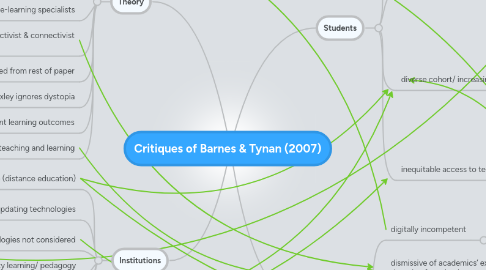
1. Institutions
1.1. dominance of ‘traditional’ lecture not supported by institutional profile (distance education)
1.2. challenges of updating technologies
1.2.1. e.g. translating info from one platform to another rather than developing content
1.3. pedagogical merits of technologies not considered
1.3.1. social media not designed for educational purposes
1.4. driven by economics over quality learning/ pedagogy
1.5. vision of 2012 too ambitious for university operations
1.5.1. e.g. SMS reminders to students
1.6. disregard alternate/competing missions of the university, department cultures and student cohorts
1.7. students = consumers, universities = service providers with goal of satisfying students
2. Theory
2.1. lack of evidence to support arguments
2.1.1. connectivism lacks underpinning of empirical research
2.1.2. e.g. “studies elsewhere…” without citations
2.1.3. causal link between Uni 2.0 and improved student outcomes lacks validity
2.1.4. call to radically rethink concept of university is not justified
2.1.5. effects of technologies in improving student learning outcomes
2.2. assume University 2.0 is necessary and positive
2.2.1. link to better learning and teaching
2.3. authors have limited perspective as e-learning specialists
2.3.1. do not address broader curriculum needs
2.4. all teaching can draw on a mix of cognitive, behaviourist, constructivist & connectivist approaches
2.5. theory section isolated from rest of paper
2.6. intertextual reference to the novel Brave New World by Aldous Huxley ignores dystopia
2.7. effects of technologies in improving student learning outcomes
2.8. simplifies issues surrounding best practice in teaching and learning
3. Academics
3.1. digitally incompetent
3.1.1. exaggerates current practice
3.2. dismissive of academics’ expertise/ devalues the role of academics
3.2.1. lectures are boring and didactic
3.2.1.1. isolates ‘the lecture’ from other pedagogies
3.2.2. assumes pedagogy is teacher-centred
3.3. challenges for busy academics
3.3.1. challenges of assessing student participation in virtual settings
3.3.2. required to learn new technologies
3.4. does not examine how teachers mighty adapt to changing dynamics
4. Students
4.1. 'digital natives'
4.1.1. immersed in Web 2.0
4.1.2. technically literate
4.1.3. prefer online learning
4.2. have resources, training & knowledge to use technologies
4.2.1. for educational purposes
4.2.2. to interact with other students
4.3. diverse cohort/ increasing participation
4.3.1. mature-aged
4.3.2. distance learners in remote/rural communities
4.3.3. low SES
4.3.4. first in family
4.3.5. Indigenous
4.3.6. learning difficulties
